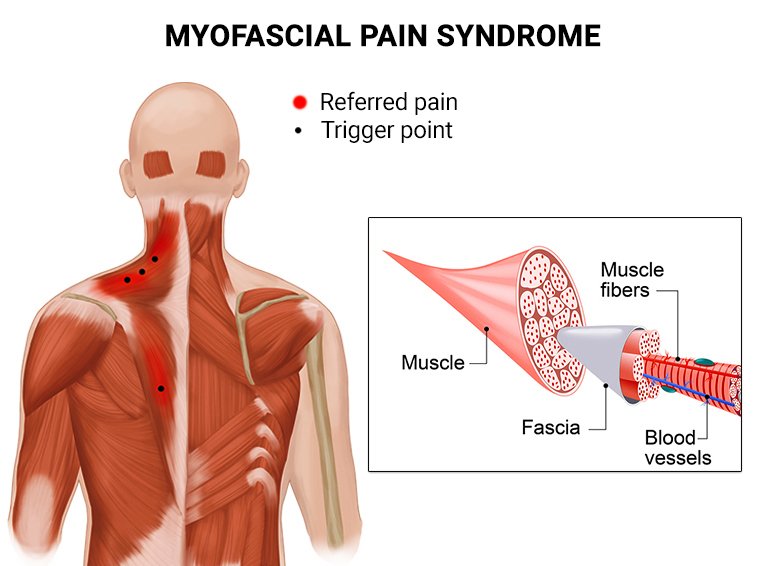Myofascial Pain Syndrome (MPS) is a chronic pain disorder that affects the muscles and the fascia, the connective tissue surrounding the muscles. This condition is characterized by deep, aching pain, often in seemingly unrelated parts of the body, due to the development of trigger points. These trigger points are sensitive areas within the muscle that can cause referred pain in other parts of the body. For those seeking Myofascial Pain Syndrome Treatment in Delhi, a variety of non-surgical treatments are available to alleviate symptoms and improve quality of life. This article will explore these treatments, highlighting the best approaches to managing MPS in Delhi.
Understanding Myofascial Pain Syndrome
Myofascial Pain Syndrome occurs when the muscle fascia becomes tight and forms knots, or trigger points, which can be felt as hard lumps under the skin. These trigger points can cause localized pain and can also refer pain to other areas, making the condition difficult to diagnose and treat. Common symptoms include:
- Deep, aching pain in a muscle
- Persistent pain or pain that worsens with activity
- Muscle stiffness
- Areas of muscle that are tender to touch
- Difficulty sleeping due to pain
The causes of MPS are varied and can include muscle injury, repetitive muscle use, poor posture, stress, and anxiety.
Non-Surgical Treatment Options
1. Physical Therapy
Physical therapy is often the first line of treatment for Myofascial Pain Syndrome. A physical therapist can help identify the specific muscles involved and develop a tailored exercise program to stretch and strengthen these muscles. Techniques such as myofascial release, massage, and dry needling (inserting thin needles into trigger points) are commonly used to relieve tension and pain.
2. Heat and Cold Therapy
Applying heat or cold to the affected muscles can help reduce pain and inflammation. Heat therapy, such as warm baths, heating pads, or heat wraps, can relax muscles and improve blood circulation. Cold therapy, such as ice packs or cold compresses, can numb the pain and reduce swelling. Alternating between heat and cold can also be beneficial.
3. Medications
Various medications can be used to manage the symptoms of Myofascial Pain Syndrome. These include:
- Pain Relievers: Over-the-counter pain relievers such as ibuprofen, acetaminophen, and naproxen can help reduce pain and inflammation.
- Muscle Relaxants: Medications like cyclobenzaprine can help relax muscles and reduce pain.
- Antidepressants: Certain antidepressants, such as amitriptyline or duloxetine, can be effective in managing chronic pain and improving sleep.
4. Transcutaneous Electrical Nerve Stimulation (TENS)
Low-voltage electrical currents are used in TENS therapy to reduce pain. Small electrodes are placed on the skin near the painful area, and the electrical impulses disrupt the pain signals being sent to the brain. TENS units are portable and can be used at home for convenient pain management.
5. Lifestyle Modifications
Making certain lifestyle changes can help manage and reduce the symptoms of MPS:
- Regular Exercise: Engaging in regular physical activity, such as walking, swimming, or yoga, can help keep muscles flexible and reduce pain.
- Proper Ergonomics: Ensuring that your workspace is ergonomically designed can help prevent muscle strain and the development of trigger points.
- Stress Management: Techniques such as mindfulness, meditation, and deep breathing exercises can help reduce stress and its impact on muscle tension.
- Healthy Diet: Eating a balanced diet rich in fruits, vegetables, lean proteins, and whole grains can support overall health and reduce inflammation.
Finding the Right Treatment in Delhi
Delhi is home to numerous healthcare facilities and specialists who offer comprehensive care for Myofascial Pain Syndrome. At Dr. Smita Gulati Pain Relief Clinic, patients can access a range of non-surgical treatments tailored to their specific needs. Our team of experienced professionals is dedicated to providing personalized care and helping patients achieve optimal pain relief and improved quality of life.
Conclusion
Myofascial Pain Syndrome is a chronic condition that can significantly impact a person’s quality of life. However, with the right combination of non-surgical treatments, it is possible to manage and reduce the symptoms effectively. Myofascial Pain Syndrome Treatment in Delhi offers a range of therapies, including physical therapy, trigger point injections, acupuncture, massage therapy, and lifestyle modifications. In Delhi, patients have access to these treatments and can benefit from the expertise of experienced specialists. By seeking treatment, individuals with MPS can find relief and regain control over their lives.
For any further queries, Plz visit drsmitagulatipainrelief.com



